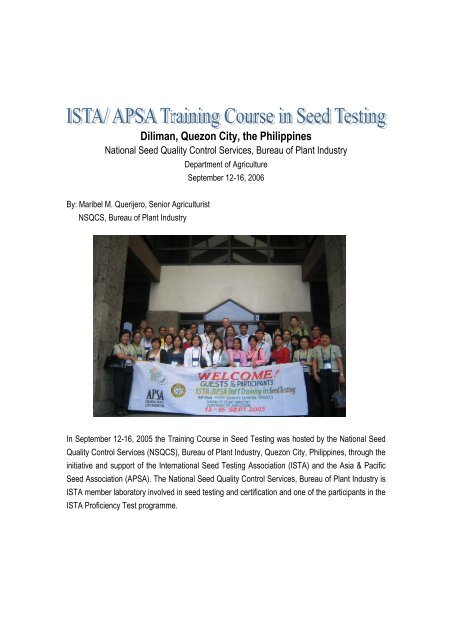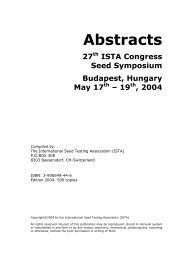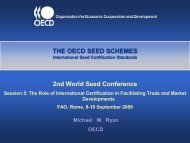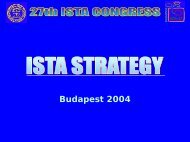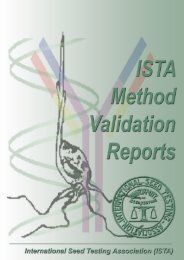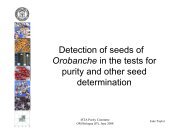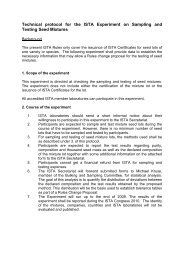Diliman, Quezon City, the Philippines - International Seed Testing ...
Diliman, Quezon City, the Philippines - International Seed Testing ...
Diliman, Quezon City, the Philippines - International Seed Testing ...
You also want an ePaper? Increase the reach of your titles
YUMPU automatically turns print PDFs into web optimized ePapers that Google loves.
<strong>Diliman</strong>, <strong>Quezon</strong> <strong>City</strong>, <strong>the</strong> <strong>Philippines</strong><br />
National <strong>Seed</strong> Quality Control Services, Bureau of Plant Industry<br />
Department of Agriculture<br />
September 12-16, 2006<br />
By: Maribel M. Querijero, Senior Agriculturist<br />
NSQCS, Bureau of Plant Industry<br />
In September 12-16, 2005 <strong>the</strong> Training Course in <strong>Seed</strong> <strong>Testing</strong> was hosted by <strong>the</strong> National <strong>Seed</strong><br />
Quality Control Services (NSQCS), Bureau of Plant Industry, <strong>Quezon</strong> <strong>City</strong>, <strong>Philippines</strong>, through <strong>the</strong><br />
initiative and support of <strong>the</strong> <strong>International</strong> <strong>Seed</strong> <strong>Testing</strong> Association (ISTA) and <strong>the</strong> Asia & Pacific<br />
<strong>Seed</strong> Association (APSA). The National <strong>Seed</strong> Quality Control Services, Bureau of Plant Industry is<br />
ISTA member laboratory involved in seed testing and certification and one of <strong>the</strong> participants in <strong>the</strong><br />
ISTA Proficiency Test programme.
Topic of <strong>the</strong> Training Course was Sampling, Purity, Germination, Tetrazolium, <strong>Seed</strong> Health testing<br />
and ISTA Accreditation. There were 20 participants from nine countries in <strong>the</strong> Asia Pacific region<br />
namely, China (1), Hongkong (1), India (3), Japan (2), Korea (1), <strong>Philippines</strong> (7), Taiwan (1),<br />
Thailand (3) and Vietnam (1) from both government and private seed companies and institutions<br />
engaged in seed production, trade and seed quality control.<br />
The <strong>International</strong> <strong>Seed</strong> <strong>Testing</strong> Association had an invaluable contribution in supporting<br />
<strong>the</strong> training course through <strong>the</strong> expertise of ISTA lecturers, Prof. Dr. Norbert Leist and Ms. Andrea,<br />
coming from <strong>the</strong> LUFA, Augustenberg, Germany, Department of Agrobiology, <strong>Seed</strong> <strong>Testing</strong> and<br />
Applied Botany.<br />
The opening ceremony was held at <strong>the</strong> Sulo Hotel in <strong>Quezon</strong> <strong>City</strong>, <strong>Philippines</strong>. Mr. Lealyn<br />
A. Ramos and Mr. Dante V. Fidel, directors of The Bureau of Plant Industry, Mr. Henry T. Carpiso,<br />
NSQCS chief, Dr. Francisco Malabanan, GMA Rice Program director and Mr. Willy, APSA Co-<br />
President greeted participants at <strong>the</strong> oppening ceremony.<br />
The lectures and practicals were conducted at <strong>the</strong> NSQCS laboratory. Mr. Henry Carpiso<br />
and his staff were able to prepare interesting seed samples that opened ground for discussion and<br />
exchange of ideas and experience from respective laboratories. The technical knowledge and wide<br />
experience of <strong>the</strong> ISTA experts encouraged participants to learn more of <strong>the</strong> evaluation procedures<br />
following <strong>the</strong> ISTA rules and standards. Prof. Dr. Leist emphasized <strong>the</strong> importance of uniformity in<br />
seed testing and <strong>the</strong> establishment of standards as well as ensuring <strong>the</strong> qualified implementation of<br />
procedures that are comparable worldwide.<br />
Participants had <strong>the</strong> chance to increase <strong>the</strong>ir knowledge:<br />
- of <strong>the</strong> seed sampling, as <strong>the</strong> most important step in <strong>the</strong> laboratory for obtaining<br />
<strong>the</strong> representative sample of <strong>the</strong> entire seedlot<br />
- of <strong>the</strong> significance of <strong>the</strong> purity test prior any fur<strong>the</strong>r test shall be conducted<br />
- that <strong>the</strong> germination test has to be conducted with <strong>the</strong> appropriate media,<br />
temperature and light requirement for each seed type<br />
- of <strong>the</strong> ISTA accreditation and <strong>the</strong> significance of <strong>the</strong> quality management in seed<br />
testing laboratories.
Participants also had <strong>the</strong> chance to visit <strong>the</strong> <strong>International</strong> Rice Research Institute (IRRI), Los<br />
Banos, Laguna, which was very informative and enabled participants to see <strong>the</strong> IRRI genebank<br />
and seed testing facilities as well as have a glimpse of <strong>the</strong> <strong>Philippines</strong> rice farming area.<br />
The five day training was not only work. Even with <strong>the</strong> very intensive schedule and interesting<br />
practicals and lectures, <strong>the</strong> participants were given <strong>the</strong> chance to explore <strong>the</strong> city life in <strong>the</strong><br />
<strong>Philippines</strong>, to taste some Filipino food and to experience some of <strong>the</strong> Philippine culture.<br />
The most important major output of <strong>the</strong> training course is <strong>the</strong> new knowledge and skills gained from<br />
<strong>the</strong> ISTA experts as well as <strong>the</strong> experience exchange with o<strong>the</strong>r colleagues, which is all brought<br />
back in respective countries. With this kind of capacity building trainings, <strong>the</strong> seed industry can<br />
become more productive and successful in <strong>the</strong> trade of <strong>the</strong> quality planting materials, particularly<br />
<strong>the</strong> SEED.<br />
normal and abnormal seedlings<br />
Participants<br />
conducting<br />
germination test<br />
using <strong>the</strong> sand<br />
method
Ms.Jonitz &<br />
participants inside<br />
<strong>the</strong> IRRI gene<br />
bank<br />
Purity testing . is a very interesting subject<br />
Participants looking at <strong>the</strong> samples of o<strong>the</strong>r Participants enthusiastic to know how to identify o<strong>the</strong>r<br />
seeds and weed seeds during <strong>the</strong> practicum on species during purity testing lecture by Prof. Dr. Leist.<br />
Participants looking at <strong>the</strong> samples of o<strong>the</strong>r seeds and weed seeds during <strong>the</strong> practicum on purity testing.<br />
purity testing.<br />
Prof. Dr. Leist imparted to all <strong>the</strong> participants,<br />
”All <strong>the</strong> flowers of today are <strong>the</strong> seeds of<br />
tommorow”. ”We shall work in many aspects of<br />
seeds and seed life and <strong>the</strong> knowledge shall<br />
increase like <strong>the</strong> seeds grow.”


